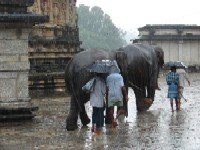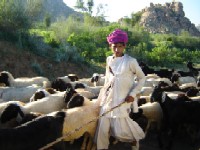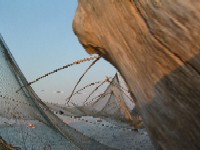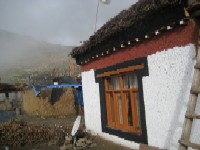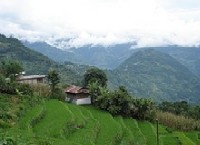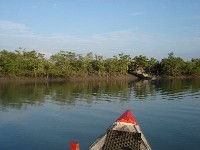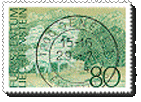 Inviting sketches for book on status of rivers in Kerala
Inviting sketches for book on status of rivers in Kerala
0 Comments
Published by GP
on Sunday, 21 March 2010
Titled, 'Puzha Malayalam', the 400-page book is looking at a participatory model where people from different spheres of life join us in the publication of the book. As a small step towards this, we are inviting interested people through a drawing competition from across the world to sketch the introductory pages of the fourteen chapters.
'My river' is the theme of the competition. This could be a reflection of your insights or experiences associated with rivers.This could be about rivers from any parts of the world. Use your imagination to show the role of rivers played in your life. Let the river flow, from Nila to Ganges, to Thames to Danube...
Out of the sketches, we will select 14 entries in three different age categories, which will be incorporated into the individual chapters of the book. The winners of 14 entries will also get an opportunity to have an experiential responsible tourism for a week along the Bharatapuzha (River Nila) that gives insights into its culture, folk art forms, history, people and life. The holiday is sponsored by The Blue Yonder. A board of experts commissioned by Nila Foundation will be short-listing and selecting the winning entries. Selected entries will also be exhibited at the book launch on 05 June 2010 at Thunjan Parambu literature park in Tirur, Kerala.
As the awards will have three categories for ages below 10, 18 and above, we welcome people from all ages to participate in this initiative. Those sending hardcopy of their sketches should draw using black ink in white drawing paper (10inch*8inch). Digital work is acceptable. Any scanned images of the work should be of min 300 DPI quality not more than 5 MB. One applicant can send up to three images. A separate note on the background of the sketch in not more than 500 words is appreciated. Provide us information of your age and nationality. Authenticity of the sketch has to be self attested. Last date for receiving the sketch is 25th April 2010.
For more details on the book visit
Hard copies of the sketches to be sent to the following postal address.
Contact person: Prakash M
Address:
Nila Foundation
SMAAS, Kandath Complex Poongottukulam,
Tirur- 676101 Malppuram(Dist), Kerala, India
Ph: +91.9446280603 / 9605396238
email address to sent the sketches: nilafoundation2010@gmail.com
Subject: Sketches for Puzha Malayalam
Labels: Responsible Tourism, River Nila
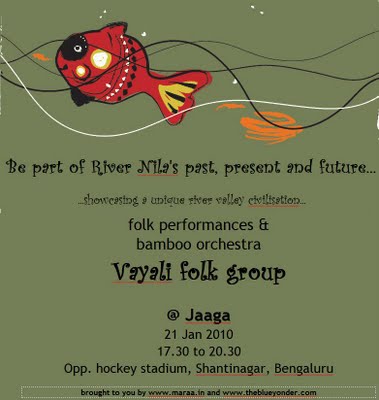
The Blue Yonder is partnering with Maraa to organise folk expressions from Vayali. Part of the 'Near the river ' series, the evening is a continuation of show casing the unique culture and civilisation of River Nila in Kerala (Bharathapuzha).
The performance is held at JAAGA, near hockey stadium in Shantinagar, Bangalore.
Date 21 Jan 2010
Time: 17.30-20.30
More details check out the site
Labels: Bangalore, Folk expressions, Maraa, River Nila, The Blue Yonder, Vayali
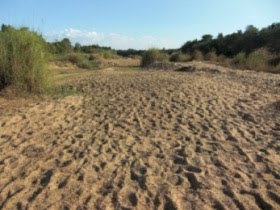
“In May 2007, BBC world was making a programme called Climate Watch where they were collecting information on the impact of global warming on local population and destinations in different parts of the world, including India. They got in touch with us and told us they wanted to document the impact of global warming on the river Nila (Bharatapuzha) in central Kerala. The river had by then started gaining international attention following our campaign to highlight this unique river valley civilization being destroyed through human greed.
Bharatapuzha, otherwise poetically called Nila, is the longest river in the Indian State of Kerala. Kerala has a unique network of 44 rivers in a land that is just 580km long where the average width comes to about 50kms. The river Nila is dammed in many locations; rivulets and streams flowing into the river have dried up because of various construction activities and lifestyle changes."
Read more excerpts and details of the book 'Disaster prevention in tourism'
Labels: Climate Change, Media, River Nila
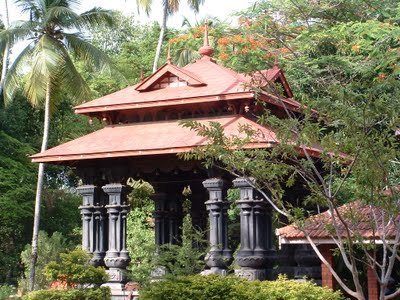
The 'Mandapam' in Thunjan Parambu where the author was initiated into learning in 1976
'Vidyarambham' is a secular South Indian tradition of initiating children into the world of knowledge by wiring letters on sand or rice grain. Yesterday, more than four thousand toddlers were initiated into learning as part of the Navarathiri festival at Thunjan Parambu near Tirur, in Malappuram district in Kerala. Thunjan Parambu is a memorial of medieval poet Thunchath Ezhuthachan, revered as father of Malayalam literature, where children are brought to write their initial letters on sand and rice grains.
Writer C Radkahrishnan says, "It was in Thunjan Parambu that Ezhuthachan modified the Malayalam alphabets and wrote the Harinamakeerthanam to popularize them. Even after centuries people from various parts of the state come to take sand from Thunjan Parambu to initiate their children to the alphabet."
It was in Thunjan Parambu that Ezhuthachan taught and spent better half of his life. Here one can find the original stylus which Ezhuthachan wrote the Malayalam Ramayana, a Hindu epic. Legend says that the whole Ramayana in Malayalam was recited to the author by a parrot so that he could compose tirelessly without having to stop in between.
The literature park designed according to traditional Kerala architecture, has a beautiful bronze statue of the parrot and larger version of the Iron stylus and the palm leave in with which he wrote the epic. The legend says that the Nux Vomica tree with bitter leaves here has lost their bitter taste to sweet wisdom.
Thousands of children were initiated into the world of letters on Monday at public functions organised by religious/educational institutions, charitable organisations, cultural and media establishments across the state as part of the Vidyarambham ritual marking the conclusion of the Navaratri festival. More news here
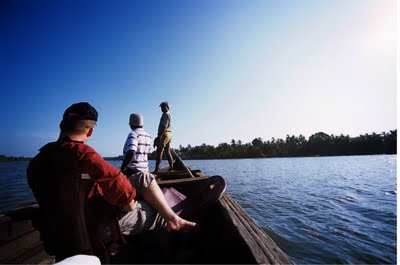
a peaceful journey through Tirur river
Most of the trips that The Blue Yonder organises along the River Nila is initiated by a visit to Thunjan Parmbu followed by a serene country boat ride through the Tirur River that joins Nila before pouring into the Arabian sea at the estuary in Ponnani. Check out for more details here.
Labels: Kerala, Literature, Responsible Tourism India, River Nila, Thunjan Parambu
sapling planted last year post monsoon.
The idea is to ensure that we don't just plant some saplings here and there, but replicate miniature sacred groves that were so plenty in our area even couple of decades back.
Dr M. S Swaminathan once said of Sacred Groves "Unlike, a botanical garden where a wide range of trees and plants are collected and cultivated for the purpose of education and enjoyment, the sacred groves are one method of expressing the gratitude of human families to the trees which sustain and support life under a given agro-ecological condition."
volunteers from Vayali on their way to traveller's forest
Trustees of "punjarjeevani' who are implementing partners of The Blue Yonder and Nila Foundation
Of the 120 saplings we planted, many of them were special as we planted it on behalf of many people we knew. Listing some of them here.
** May I have a "I love my son" tree?
** Could you please plant a tree for our wedding date
** For my family
** One for the spirits of the past, present and future?)
** For a life that is full of adventures
** One for the decriminalisation of gay sex in India (which for me is a big step in a democracy),
** Another one for the strife in Iran (whatever, the outcome, it makes me happy to see that people come together to fight for their freedom. It gives me hope)
** A tree for a marriage I witnessed
** A tree just to celebrate life (and lots of thoughts and wishes).
** "THANK YOU for a good life" tree
"if its not too late, could I have one more tree for my Uncle Johnny? He loved them, would never even accept cut flowers until the end of his life - scolding people who "killed plants":) And he always wished to be remembered in this way, actually..."Plant a tree for me!" he used to smile.."And I'll be with you always.." Could you - please? "
Volunteers from Vayali and Pravah at the "traveller's forest"
While we planted for our friends around the world, we had few things to look at. We planted trees for /to
** our team at Vayali who won the Change Loom Awards last week,
** to celebrate the naming ceremony of one of our colleague's son,
** to make up for a bird that one of us killed when he was 7 years old ( yeah, now don't think this is like a carbon-offset program! ;)),
** a plant for our friends and families,
** for an uncle who died,
** for a friend who lost her son in an accident,
** for a colleague who completed an amazing book on rivers in Kerala,
** for our teachers and more than anything
** for a river that we have pledged to bring back life into it.
** for a river that brought many of us together to understand the meaning of life!
Why don't we all start planting trees to celebrate? Why gift useless presents for your friend's wedding, when giving a plant could bring cheer for many generations to come?
More pictures from the planting can be seen here
Labels: Kerala, Nila Foundation, Responsible Tourism, Responsible Travel, River Nila, Sustainability, The Blue Yonder, Travellers Forest, Water
 Important archaeological finding left un-attended
Important archaeological finding left un-attended
0 Comments
Published by GP
on Monday, 22 June 2009
A finding of historical importance left un-cared
Anakkara along River Nila is becoming a site of great importance because of many recent findings. So this morning we decided to go and find more details that that is available online. Idea was to meet the local Panchayat president, meet the owner of the place ( the land belongs to a private school that is constructing massive buildings in the vicinity). With such an important finding, we were expecting proper protection for the area, ensuring that no further damage is done to the location. Instead all we could see was a thin coir rope tied around a radius of about 5 metres. That's it! The following pictures were taken today and the text in quote is from two articles that came out in The Hindu 10 / June / 2009 and 21 / May / 2008
"The archaeological excavation at Anakkara in the district gave evidences of first excavated Iron Age habitation-cum-burial site in Kerala. Carbon dating of charcoal fragments and physical anthropological studies of bones would give more information on the chronology and life pattern of people lived in this area."
"Archaeologists have discovered a pre-historic necropolis (cemetery) with megalithic cairn circles dating back 2,500 years, many post holes that probably point to the ancient practice of excarnation, a 'wood-henge'-like ritual monument and a site of primitive astronomical intelligence at Anakkara, near Kuttippuram in Malappuram district."
River Nila flows in the background of the escavated site.
"Excavations at the site, a laterite plateau atop one of several primary hills overlooking the Ponnani river at Valayangad in Anakkara grama panchayat, have revealed three chamber tombs containing burnished black and red ware, black bowls and some iron objects commonly seen among megalithic grave goods. Archaic features of the burial type and the conspicuous absence of non-local artefacts among the interred objects suggest that the find is around 2,500 years old. Valayangad literally means the burial place with cairn (stone) circles, derived from the ancient necropolis of cairns. "
The three burial rooms refered in the press reports
"Interior of the stone circle is divided into three chambers using granite boulders. In this, two chambers were excavated and in each chamber large burial urns with burial goods like iron implements, bone and pots were noticed. Special features of the burials are the occurrence of a hanging lamp and the burial goods were found kept in the river sand at the bottom of the urn, possibly indicating some sort of rituals associated with riverbanks."
In less than 100 metres away from the 'escavated burial ground, laterite stone cutting is going on un-disturbed. It was in a similar site that workers came across "caves" and gets reported to the Archaeological Survey of India. If this finding was in some other countries, I can't imagine this happening. Reckless Government, reckless people?
Labels: Anakkara, Archeology, History, Kerala, River Nila, The Blue Yonder
 TBY featured twice among '500 new ways to see the world'
TBY featured twice among '500 new ways to see the world'
0 Comments
Published by GP
on Tuesday, 16 June 2009

Cover page: edited by Jeremy Smith and Richard Hammond
Discusses 500 experiences and different ways to travel. This book lets you discover various adventures from sleeping in houseboats in Kerala and witnessing the zebra migration in Botswana to taking the train-hotel from Paris to Madrid. It offers information on the best hotels, resorts, and tours run by people who are passionate about what they do.

Pic: Kerala scenes, Kathakali performance, practicsing Kalaripayattu, peppercones growing in the sun
The following excerpts are from the book
" To really discover the heart of Kerala, you need to leave the beach, jump off the houseboat or troop down from the hills to the banks of the River Nila, where a variety of traditional activities are on offer with The Blue Yonder...."

"The Blue Yonder take guest to see people who make dolls like this"
"The largest state in India, Rajasthan is also one of the most beautiful and exciting - home to colourful markets, welcoming cities, vibrant music and delicious cuisine. The royal palaces that pepper the state feature heavily on tourist itineraries, rich , decorative and intricate, they epitomize the luxury and decadenance of the Raj. But for those who want to go behind the scenes, India-based travel company The Blue Yonder runs custom-made trips that allow you to explore what really makes Rajasthan tick. "
Labels: Foot Print Guide books, Jeremy Smith, Kerala, Media, Rajasthan, Responsible Tourism, Responsible Travel, Richard Hammond, River Nila, The Blue Yonder
 Pre-historic cemetery discovered along River Nila
Pre-historic cemetery discovered along River Nila
0 Comments
Published by GP
on Friday, 12 June 2009

A 'wood-henge'-like ritual monument, discovered at Anakkara, near Kuttippuram in Malappuram district. Photo from The Hindu
Labels: Bharathapuzha, Kerala, Responsible Tourism, Responsible Travel, River Nila
 TBY amongst the Condé Nast Traveler's 8 great trips that give back
TBY amongst the Condé Nast Traveler's 8 great trips that give back
0 Comments
Published by GP
on Tuesday, 5 May 2009

April 2009 edition of Condé Nast Traveler has featured The Blue Yonder holidays as one of the 8 great trips that give back. The series of short articles introduces various trips in different parts of the world, "You don't have to wear a hair shirt and dig a well to give back when you travel. Here are 8 great trips that connect you with the world"
The article has quite a lot of factual errors, however shows the spirit of the holiday. Along with our holidays along River Nila in Kerala (India), the other countries featured are Mozambique, Mexico, South Africa, Cambodia, Jordan, Costa rica and Kenya.
Labels: Conde Nast Traveler, River Nila, The Blue Yonder

Award plaque designed by Potter Gopalan
We were highly commended at the First Choice Responsible Tourism Awards 2006 in London, Condé Nast Traveler World Savers Award 2007 and came runner up in 2008 Travel Mole Asia Responsible Tourism Website category. The recognition is continuing and we are glad to share many other awards in 2009 as an acknowledgement of the quality of holidays we are offering to discerning travellers to India.
*The Week ( 15 Healthy things to do in 2009)
*Footprint Handbook 2009 amongst the "6 very best sustainable Tourism initiatives in India"
*Irish Times recommends us in the "5 eco trips for 2009"
*Rough Guides "Clean Breaks: 500 New Ways to See the World" by Richard Hammond and Jeremy Smith, published August 2nd 2009
Kevin Rushby visiting River Nila (pic Arun Prabhakaran)
Even though all these awards are encouraging and we are proud to receive such recognition, there will be no award that will match what we received in December 2007. This was given to us by the communities that we work with, who gave a memento to The Blue Yonder for bringing in attention to the region and for the efforts we have taken to revive and support art forms along Nila. Amongst all other recognition we have received in the last four years, we don't think there will be any other that will remain so close to our heart than this appreciation from our own people.

Potter Gopalan at his workplace (pic Susanna Hagen)
Story of Gopalan, the potter: When we met Gopalan 4 years ago, he was a another struggling potter in Arangottukkara with occasional work orders. He is from a community called 'Kumbhara" a group of traditional potters that migrated from Andhra Pradesh many hundred years ago searching for an ideal location to work on the only skill they had. Like many other communities that settled on the banks of the Nila from different parts of the country, the Kumbhara community also made it their permanent base. The clay on the banks of the river was so refined that they could create magic out of it. For the skills and the culture they brought in, they stood out amongst other people. When we were growing up as kids, we found them funny because of the dialect they used to communicate amongst themselves! They were not talking Malayalam, instead they were talking a dialect that originated from Telugu and Malayalam.
At some point of our growing up, we saw the magicians in them. We got closer to them. We saw how they tame the clay on a cart wheel and how the raw clay turned into such beautiful artifacts at the whims and fancies of their skilled fingers!. There were plates, vases, mugs and all that our parents used in our kitchens. To know that the food that was cooked lovingly for us came from the magic created by Kumbharan community, it brought us even more closer to them.
We all moved on. From our village, away from our river, we went travelling. Some for studies, some for jobs, some to escape the village lives. Some of us ran away from our nosey relatives! But when we came back to the smell and breathe of our river later, one of the first nostalgic memories that came back to us were of these potters! The art they used to weave, the cultural richness that made the river valley civilisation so unique.
'A burnt down river-bed!' in Palakkad district (pic Sandra Wels)
The same river that was once a lifeline of Malabar region in Kerala is now struggling because of human greed and intervention. We dammed it, we cut all trees possible in the catchment areas, we stopped farming by the side of the river, squeezed out every single drop of water available and finally started taking away even the fine sands on the banks of the river to build our houses.
The river gave all it can, we demanded more. The river laid it all bare, we opened up her chest. In the place of fine sand and shallow water that formed the river bed, all we see is wild grass that stands taller than us. There was a time when we couldn't see what was on the other side of the river because of the water that was touching on both the banks. Now we can't see what is on the other side of the river because of the tall grass that is growing so wild.
The river that made many of us romantic and passionate human beings, was disregarded. We stopped listening to her cries, we went on with our lives as if she was no longer part of it. There was a time when we used to see workers from mountains coming into our villages on bamboo barges that were cut in the high mountains of the western ghats. We use to playfully climb on them and go with from Thrithala to Kuttipuram and then to Tirunavaya and Chamravattom. The brave ones climbed on to the slippery barge, the rest swam along for some distances. But all those memories are bygone. Our kids don't believe any more when we tell them that there was a beautiful river there. Once! Not too long into the past, but just a decade ago!
In modern times however, people like Gopalan is struggling to sustain his only known skills (even with more and more work orders coming in), because the younger generation don't even want to take up this as a profession. No one wants to 'dirty' their hands any more. But this doesn't stop the man from exploring new dimensions into his work. When the community that we work with along the Nila decided to appreciate the impact of Responsible Tourism in their day to day lives, they approached Narayanan to create the memento that depicts the universal eco-living!
Work orders from travellers (Pic: Birgit Bermann)
We are however glad to share Narayanan's words to a documentary film maker who recently visited Nila. "Social recognition to my work was the most important contribution of Responsible Tourism to our community and also this brought in more work orders from curious travellers, and locals and even from small resorts and restaurants who were trying to incorporate traditional values in their business. Actually in the last few months, we have been looking for assistants to help us complete our work as the work orders have increased!! "
© The Blue Yonder 2009
Labels: Awards, Pottery, Responsible Tourism, River Nila
 River Nila initiative amongst India's "very best" 5 Sustainable Tourism initiatives
River Nila initiative amongst India's "very best" 5 Sustainable Tourism initiatives
0 Comments
Published by GP
on Friday, 23 January 2009

From the Footprint India guidebook 2009 :
" In a country of a billion people, conservation efforts can only succeed when they bring real, tangible, benefits to local communities, while ecotourism worthy of the name also has to provide you, the travellers, with an unforgettable experience.
The following ventures in sustainable tourism are among India's very best."The Blue Yonder, River Nila, Kerala.The river Nila flows through some of Kerala's richest scenic and cultural landscapes, exercising a Ganges-like influence over the spiritual and artistic life of northern Kerala. The Blue Yonder, tours, born of a desire to halt degradation of the river, have had a transformative effect on local culture. Journeying by jeep, hand-propelled thoni boat and bamboo raft, passionate local guides introduce guests to classical musicians, snake worshippers and sand miners, and decade unforgettable folk performances a million miles removed from the tourist spectacles proffered by the big resorts. In doing so, the tours demonstrate- to the locals as much as travellers - that the river and its traditions are integral elements of a sustainable, fruitful future. "
Labels: Foot Print Guide books, India, Responsible Tourism, River Nila, Sustainable Tourism

Bangalore © The Blue Yonder 2008
Labels: Kerala, Media, Musical Trail, Press, Responsible Tourism, River Nila, The Blue Yonder
 "Near the River' series to launch "The Artist's Haven' with Rob Pepper
"Near the River' series to launch "The Artist's Haven' with Rob Pepper
0 Comments
Published by GP
on Thursday, 30 October 2008

near the river logo:
"The Artist’s Haven - 23rd February - 8 March 2008"
- Rob Pepper and Aimie Littler join hands with TBY to draw River Nila:
The Bharatapuzha, also known as the River Nila, is the lifeline of Kerala. In many ways, it nurturued Kerala's culture, literature, science and ethos. Malayalam language itself was born on its banks. Many famous writers, singers, folk and classical artists still live in villages that the river embraces right from Kalpathy in Palakkad to Ponnani in Malappuram district.
Says Jnanpeeth award-winning writer MT Vasudevan Nair: "For me, Nila's significance is greater than that of the greatest ocean in the world. Much of my inner and external life is associated with the river Nila and Koodallur village located on its bank. The Nila and and Koodallur together form the backdrop for many of his novels, short stories and screenplays. In a sense, the Nila has inspired and brightened Kerala's mindscape. Today, the river appears to be choked by the needs and greed of modern civilization and is reduced to a mere trickle. Its tributaries are dammed to oblivion, channels sucked out by commercial interests, cool forests on its catchments butchered to satisfy consumer needs.
Death of the river Nila would mean an insult to a long line of writers, performing artists thinkers and sages who live on its banks and nurture Kerala's spirit, thoughts and dreams - in short, the very identity of Kerala.

Pic: Artist Rob Pepper
'Near the river' is an effort to direct the spot light onto a unique river valley civilization. Into its third year, ’Near the river’ provides an opportunity for art and culture inclined travellers to sketch a river that is often the thread that weaves lives and traditions in an ageless manner.
The Blue Yonder is partnering with London based Artists Rob Pepper & Aimie Littler for a two week art retreat along the river in Kerala. While working with Rob and Aimie, the travellers will get an opportunity to work with local artists as well. The travel with local interpreters will give insights into the uniqueness of the region and the group will be capturing this through drawing. The tour will conclude with a two-day exhibition of the images captured by the travellers in one of the leading art galleries in Cochin and / or Bangalore.
As a traveller this will be a great opportunity to explore the river and its associated culture whilst becoming an integral part of the local culture. Only a group of ten artistically inclined travellers can be taken on this group. The trip starts on the 23rd Feb for two weeks. Part of the proceedings from this trip will go towards supporting Nila Foundation. Contact us for the prices and more details on this amazing opportunity.

About Rob Pepper & Aimie Littler
Rob Pepper & Aimie Littler work out of their art studio in Islington, London. They’ve been working together for thirteen years on many artistic projects from international exhibitions, public art commissions, human rights campaigns to workshops with disadvantaged teenagers.
Rob Pepper is the artist maker and is a member of the Academic Board and a Senior Tutor at London's Art Academy. He creates large scale paintings, intimate drawings and his work has adorned album & book covers. Aimie Littler is the director of the Not For Profit Organisation "The Truth Isn’t Sexy" which works on the prevention of human trafficking. When not running this she conceptually develops the artwork, edits their publications and curates the many international exhibitions they have had over the years.
Together Rob & Aimie co-facilitate the Drawing Room which has a growing following in London. These art workshops focus upon an enjoyment of the artistic process and the nurturing of a happy group. They believe the creative impulse needs to be acknowledged as an important part of ones well being and it is this philosophy that they will be bringing to the new relationship with The Blue Yonder.
© The Blue Yonder 2008
Labels: Aimie Littler, Kerala, River Nila, Rob Pepper, The Blue Yonder

Kick start your travel writing career by going on assignment to Kerala, India. You will enjoy a 10 day tour with The Blue Yonder, offering unique insight into the River Nila civilization. Then, after touching base with your travel writing mentor - David Stott, you will hit the road for 10 days reviewing and writing for the Footprint India Handbohok!

For more details check the worldnomads.com announcement:
Labels: Foot Print, Responsible Tourism, River Nila, The Blue Yonder, Travel Scholarship, World Nomads

Interview with Sumana Mukherjee. Words like "breathing new life into Kerala's Ganga" makes one think that the River is all live and kicking now. Earlier Travelmole also carried a story with a title "Responsible Tourism averts threat to Kerala's dying river!" Irrespective of the global attention that is now falling on our small river, as a colleague once mentioned, the truth could be that when we started working it was a dying river and now probably its a dead river! But I can certainly agree to the fact that we have managed to bring together like-minded people to think and respond to the status of our river.
München ©GP 2008
Labels: Gopinath Parayil, Kerala, Responsible Tourism, River Nila, The Blue Yonder
